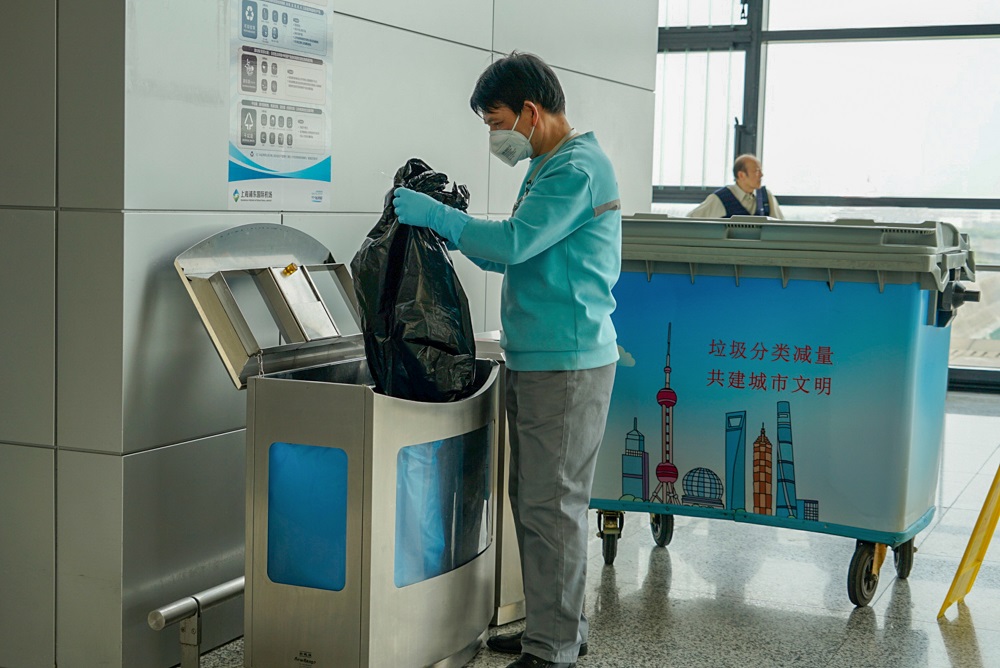Shanghai Pudong International Airport has been showcasing skillful solutions to garbage classification and management, using various approaches to make garbage from the source to the terminal more environmentally friendly and efficient.
As a world-class aviation hub, Pudong airport has always maintained large numbers of aircraft landing and taking off, passenger throughput and cargo throughput.
The airport's passenger throughput exceeded 74 million in 2018, ranking ninth worldwide, with more than 200,000 passengers a day. Such a high volume of traffic generates a huge daily amount of garbage.

According to statistics, daily domestic garbage collected at Pudong airport’s terminal totals more than 54 tons, and kitchen garbage surpasses six tons.
For the first time this year, Shanghai has enacted legislation on the whole management process of domestic waste, and the Regulations on the Management of Domestic Waste in Shanghai will be formally implemented on July 1.
As a window for Shanghai and even China's foreign exchanges, the two Shanghai airports are actively implementing the regulations by promoting awareness of waste classification, updating and improving facilities and equipment, and employing professional teams for monitoring, garbage transport and storage. Through these approaches, the airport is able to reduce garbage and make it recyclable with harmless treatment, setting an example for garbage classification and disposal.
Garbage must be sorted and classified into various kinds of material before any specific kind of disposal can be done. Posters publicizing garbage classification can be seen everywhere with promotional videos set to loop continuously.
In addition, the number of garbage bins at the airport was reduced to 79 percent and 700 of them were updated, labeled with 1,684 unified and eye-catching waste sorting signs. Besides, there are 160 special vehicles for cleaning and 40 garbage trucks operating at the airport.According to an airport manager, garbage bins have been installed in dining areas and other areas with a large flow of people. The distribution accords with the interior spatial layout of the building and is based on the movement of passengers. As well, the bins are suitable for collecting three or four categories of garbage, above what is required in the regulations.
Not only are passengers guided on how to separate waste, but also shop owners and working staff at the airport are educated in the same way so that they can serve as good examples.Furthermore, volunteers often distribute related manuals at the site to cultivate awareness and good habits in garbage sorting.

Airport staff members are shown how garbage is sorted come into red, blue, brown and black bags for better identification and disposal.
Catering stores that produce kitchen waste are required to install oil-water separators and use dedicated kitchen garbage containers for closed collection and regular cleaning. Food waste disposal permits are released to regulate and manage the transport and disposal of domestic garbage and kitchen waste, preventing the mixing of different types of garbage and treatment of undeclared kitchen garbage. Supervision and spot checks are conducted every day.
Moreover, Shanghai Pudong International Airport has set up four special garbage collection and transfer stations, where screens play looped videos on how to classify and recycle garbage to help cleaning professionals fully understand the importance of garbage classification and improve their working ability.
The airport has purchased 40 additional vehicles to transfer garbage. Specifically, cleaners collect garbage thrown away by passengers at a fixed time and location every day, and put them into trucks according to the color of the garbage bags. The garbage is then transported to transfer stations, and sorted out and checked to ensure the accuracy of the classification.
Kitchen waste is handled in a different way going through stricter procedures, according to a person in charge. Designated garbage transport companies come every day to replace full garbage bins with clean empty ones and transport the waste to outside garbage collection stations.